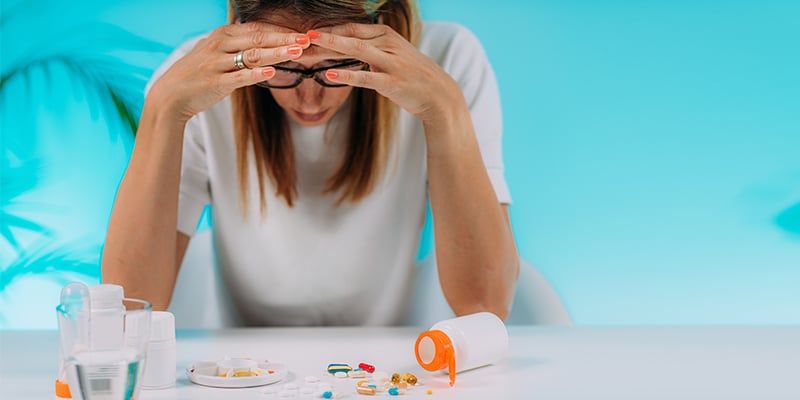
Often referred to as the “sunshine vitamin,” vitamin D is actually a hormone that should be called the “immunity vitamin” thanks to its positive effects on the immune system. It also plays an essential role in overall brain health, mood, memory, weight, and other important bodily processes.
How Low Levels of Vitamin D Harm Health
Low levels of vitamin D have been associated with approximately 200 conditions, including brain health/mental health issues (depression, autism, and psychosis), autoimmune diseases (MS, rheumatoid arthritis, and diabetes), as well as heart disease, cancer, and obesity. The link between vitamin D and mental health is strong, and over half of psychiatric inpatients are deficient in vitamin D. Low vitamin D has also been associated with memory problems and dementia.
The Protective Effects of the Immunity Vitamin
A growing body of research supports the possible role of vitamin D in protecting against autoimmune diseases, depression, cognitive function, and more. A 2008 study followed 441 overweight and obese adults with depression for one year. The individuals who took vitamin D (20,000 IU or 40,000 IU per week) reported a significant decrease in their symptoms, but those who took a placebo did not see such improvement. In a Swiss study, people who took vitamin D over a month had a significant drop in fatigue.
The Vitamin D Epidemic
At Amen Clinics, we test the vitamin D levels of all of our patients, and a staggering number of them have low levels. A report that looked at vitamin D levels for American adults in 1988-1994 compared with 2001-2004 showed that our levels are dropping. The percentage of people with levels of 30 ng/mL or more fell from 45% to 23%.
This means that 3 out of 4 Americans have low levels of this important vitamin. In part, this is due to the fact that we are spending more time indoors and using more sunscreen when we’re outdoors. The following groups are more likely to experience vitamin D deficiency:
- Older adults
- People with darker skin (reduced ability to make vitamin D from sunlight)
- People with limited sun exposure (think Northern latitudes)
- People taking certain medications, such as antihypertensives, antidiabetics, or benzodiazepines
- People with fat malabsorption syndrome, such as liver disease, cystic fibrosis, and Crohn’s disease
- People who are obese or who have undergone gastric bypass surgery
Excerpted from “The End of Mental Illness” by Daniel G. Amen, MD. At Amen Clinics, our psychiatrists and Integrative and Functional Medicine physicians treat a wide range of conditions and make recommendations for pro-active therapies to enhance or restore the immune system. For more information, speak to a specialist today at 888-288-9834. If all our specialists are busy helping others, you can also schedule a time to talk.





Great information …I’ll make sure to take this Vitamin every day …thanks
Comment by Lorna Addison — April 10, 2020 @ 2:24 AM
How much Vit. D3 is recommended for men over 85 years of age?
Comment by Phil Rash — April 10, 2020 @ 6:33 AM
How much Vit D should be taken daily? I am 66 yo female. 5 years ago I got very sick and my Vit D was 9! I now have it up to 34 and take 5000 IU s day. Doctors gave me the one 50,000 IU pill a week for 6 weeks and once it got up to 30 haven’t advised me or said another word about it so I’m pretty much self medicating.
Comment by Kathy Barthen — April 10, 2020 @ 6:56 AM
Good info but please elaborate on the amount we should be supplementing with. I’m 60
Years old and take 4000 iU daily. Would like to know how much for each as to advise my family. I live in Alberta Canada.
Comment by Peggy Turner — April 10, 2020 @ 7:33 AM
Hello Peggy, research shows that if we increase our daily intake to 5000 IU per day, it will ensure that we get the right amount of absorption for our bodies in order to feel the benefits long-term (https://brainmd.com/vitamin-d3-5000).
Comment by Amen Clinics — April 10, 2020 @ 12:02 PM
Should the D be taken with the vitamin K? , if so at what levels of each thanks Jeff
Comment by J — April 10, 2020 @ 12:12 PM
Hello Kathy, research shows that if our daily intake is 5000 IU per day, it will ensure that we get the right amount of absorption for our bodies in order to feel the benefits long-term (https://brainmd.com/vitamin-d3-5000).
Comment by Amen Clinics — April 10, 2020 @ 12:14 PM
How much vitamin D do you actually get from the sun? I live in Phoenix,az and am 62. I spend some time outdoors but not all day.i also take a multi vitamin. Would that be enough? I don’t know how to equate sunshine with mg.
Comment by Don T — April 11, 2020 @ 8:06 AM
Is there any determining factor between natural vitamin D and taking a supplement? Those populations who have individuals spending large amount of time outdoors, in the sun versus individuals who are indoors a majority of time and take a vitamin D pill. Working outdoors on my farm keeps me outside for a minimum of 3 to 4 hours per day, minimum three days a week…in daylight..
Thank you for the information…
Comment by Dr. Henry Sinopoli — April 11, 2020 @ 9:29 AM